A Detailed Report on Ikea's Market Entry and Expansion in Russia
VerifiedAdded on 2023/03/31
|10
|2528
|224
Report
AI Summary
This report provides an in-depth analysis of Ikea's business operations in Russia, highlighting the challenges faced by the company due to corruption, bureaucratic hurdles, and economic factors. It examines Ikea's market entry strategies, including their approach to pricing, product diversification, and market presence. The report explores the impact of political and economic environments, including the Russian Ruble crisis and government regulations, on Ikea's expansion efforts. It discusses the actions taken by Ikea to address ethical concerns and the importance of a strong, cooperative political machinery. The report concludes with recommendations for future business strategies, focusing on sustainability, digital marketing, and product development to ensure growth in emerging markets. The report also highlights the importance of building a strong customer relationship and ethical business practices.
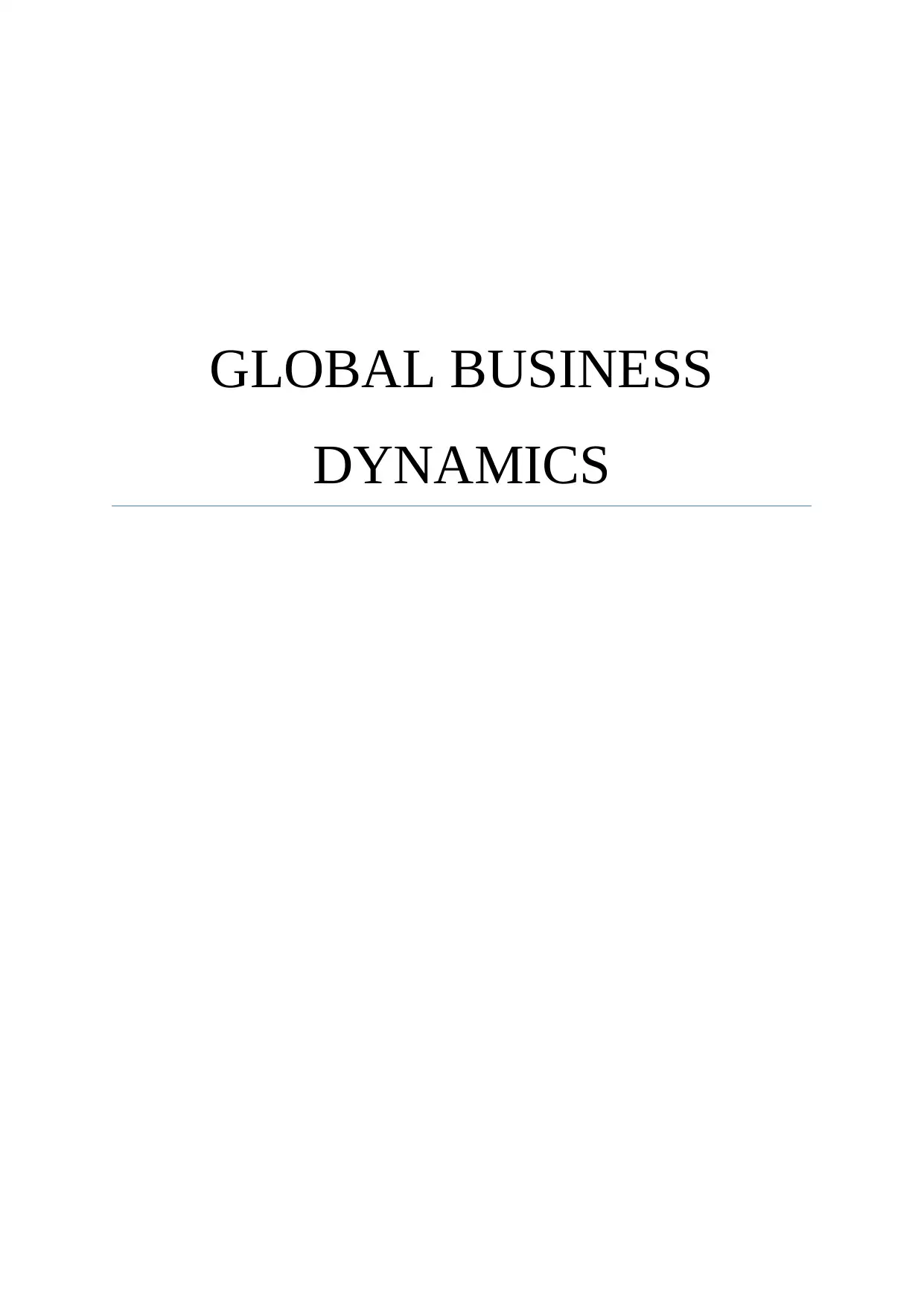
GLOBAL BUSINESS
DYNAMICS
DYNAMICS
Paraphrase This Document
Need a fresh take? Get an instant paraphrase of this document with our AI Paraphraser
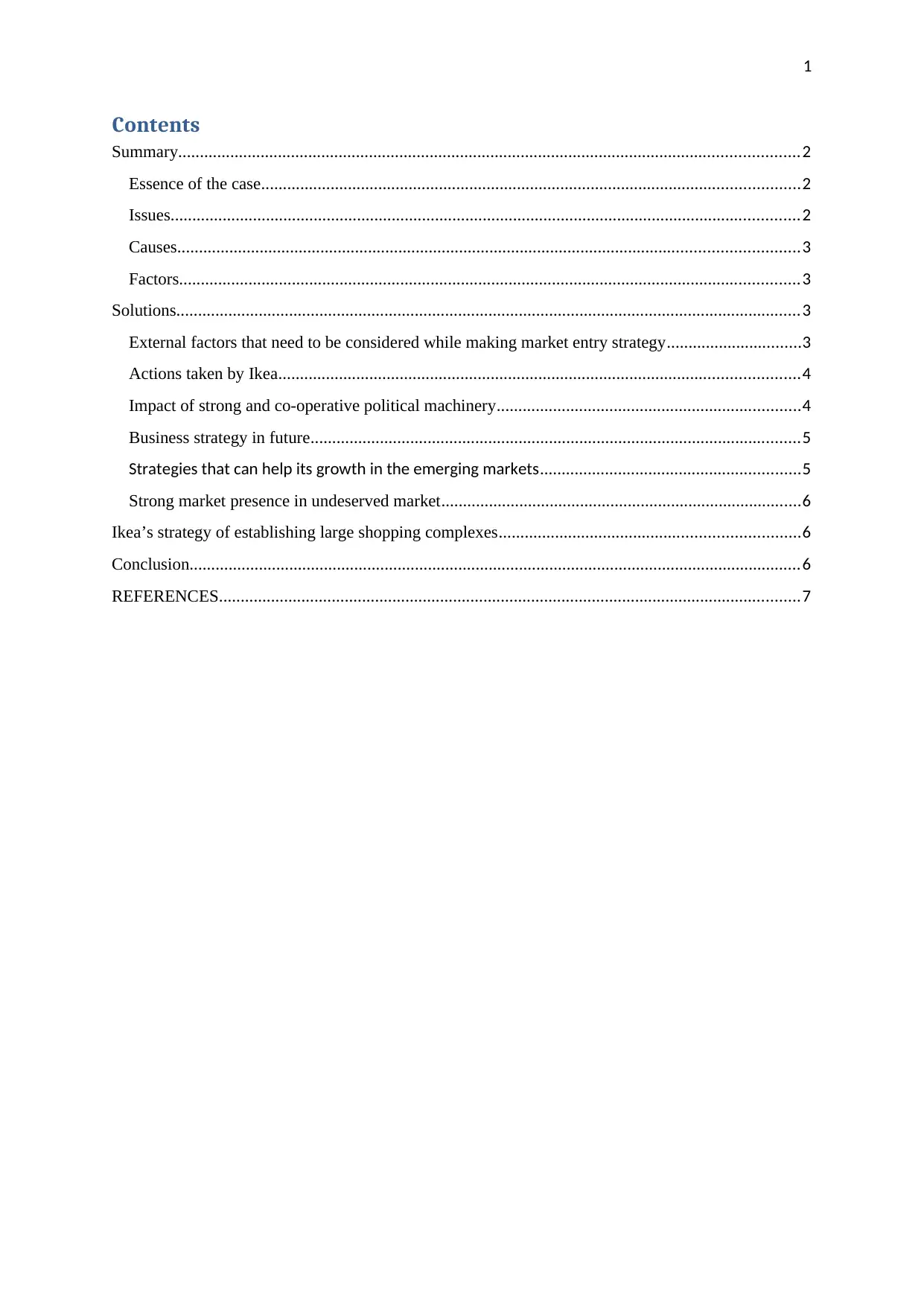
1
Contents
Summary...............................................................................................................................................2
Essence of the case............................................................................................................................2
Issues.................................................................................................................................................2
Causes...............................................................................................................................................3
Factors...............................................................................................................................................3
Solutions................................................................................................................................................3
External factors that need to be considered while making market entry strategy...............................3
Actions taken by Ikea........................................................................................................................4
Impact of strong and co-operative political machinery......................................................................4
Business strategy in future.................................................................................................................5
Strategies that can help its growth in the emerging markets............................................................5
Strong market presence in undeserved market...................................................................................6
Ikea’s strategy of establishing large shopping complexes.....................................................................6
Conclusion.............................................................................................................................................6
REFERENCES......................................................................................................................................7
Contents
Summary...............................................................................................................................................2
Essence of the case............................................................................................................................2
Issues.................................................................................................................................................2
Causes...............................................................................................................................................3
Factors...............................................................................................................................................3
Solutions................................................................................................................................................3
External factors that need to be considered while making market entry strategy...............................3
Actions taken by Ikea........................................................................................................................4
Impact of strong and co-operative political machinery......................................................................4
Business strategy in future.................................................................................................................5
Strategies that can help its growth in the emerging markets............................................................5
Strong market presence in undeserved market...................................................................................6
Ikea’s strategy of establishing large shopping complexes.....................................................................6
Conclusion.............................................................................................................................................6
REFERENCES......................................................................................................................................7
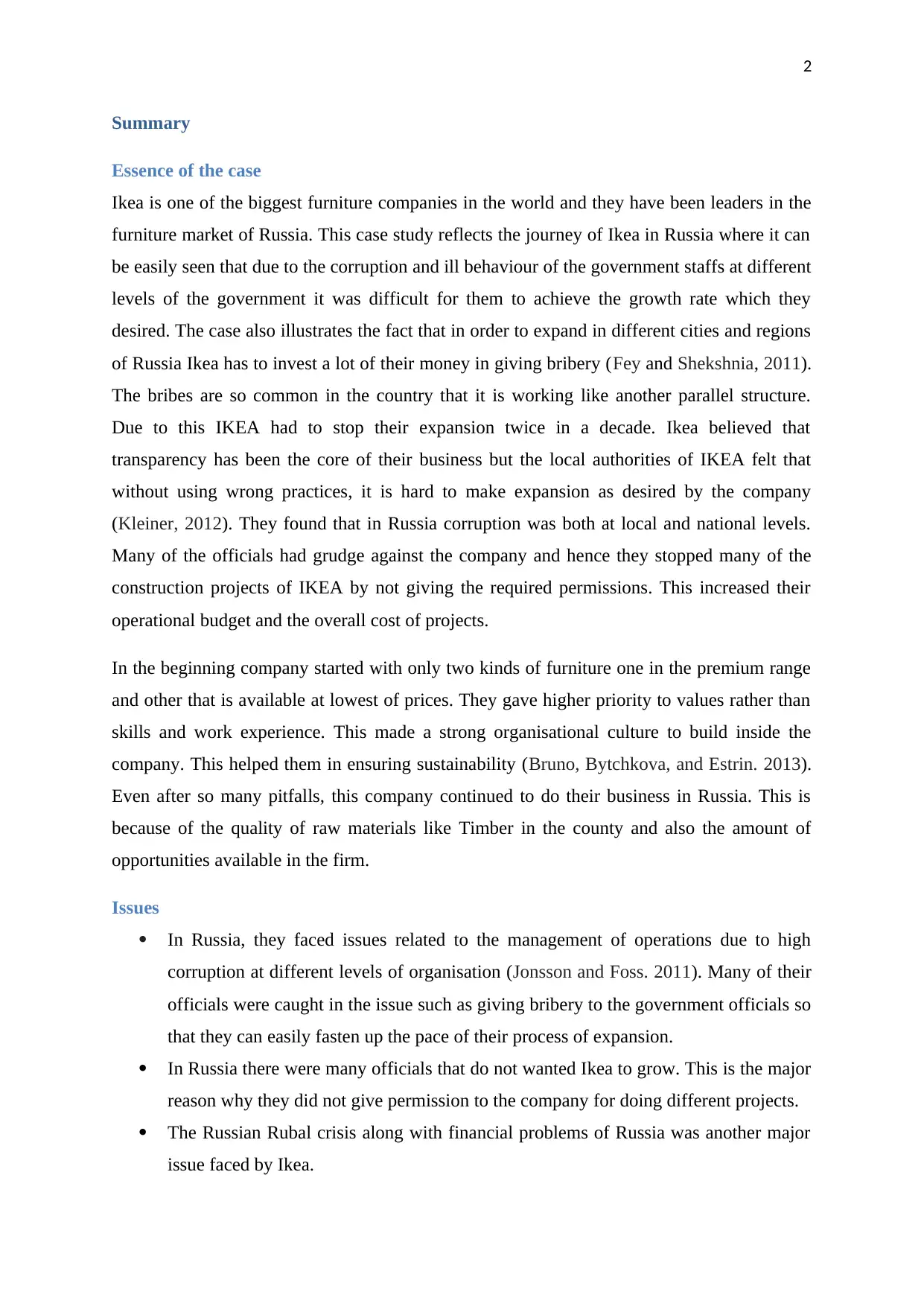
2
Summary
Essence of the case
Ikea is one of the biggest furniture companies in the world and they have been leaders in the
furniture market of Russia. This case study reflects the journey of Ikea in Russia where it can
be easily seen that due to the corruption and ill behaviour of the government staffs at different
levels of the government it was difficult for them to achieve the growth rate which they
desired. The case also illustrates the fact that in order to expand in different cities and regions
of Russia Ikea has to invest a lot of their money in giving bribery (Fey and Shekshnia, 2011).
The bribes are so common in the country that it is working like another parallel structure.
Due to this IKEA had to stop their expansion twice in a decade. Ikea believed that
transparency has been the core of their business but the local authorities of IKEA felt that
without using wrong practices, it is hard to make expansion as desired by the company
(Kleiner, 2012). They found that in Russia corruption was both at local and national levels.
Many of the officials had grudge against the company and hence they stopped many of the
construction projects of IKEA by not giving the required permissions. This increased their
operational budget and the overall cost of projects.
In the beginning company started with only two kinds of furniture one in the premium range
and other that is available at lowest of prices. They gave higher priority to values rather than
skills and work experience. This made a strong organisational culture to build inside the
company. This helped them in ensuring sustainability (Bruno, Bytchkova, and Estrin. 2013).
Even after so many pitfalls, this company continued to do their business in Russia. This is
because of the quality of raw materials like Timber in the county and also the amount of
opportunities available in the firm.
Issues
In Russia, they faced issues related to the management of operations due to high
corruption at different levels of organisation (Jonsson and Foss. 2011). Many of their
officials were caught in the issue such as giving bribery to the government officials so
that they can easily fasten up the pace of their process of expansion.
In Russia there were many officials that do not wanted Ikea to grow. This is the major
reason why they did not give permission to the company for doing different projects.
The Russian Rubal crisis along with financial problems of Russia was another major
issue faced by Ikea.
Summary
Essence of the case
Ikea is one of the biggest furniture companies in the world and they have been leaders in the
furniture market of Russia. This case study reflects the journey of Ikea in Russia where it can
be easily seen that due to the corruption and ill behaviour of the government staffs at different
levels of the government it was difficult for them to achieve the growth rate which they
desired. The case also illustrates the fact that in order to expand in different cities and regions
of Russia Ikea has to invest a lot of their money in giving bribery (Fey and Shekshnia, 2011).
The bribes are so common in the country that it is working like another parallel structure.
Due to this IKEA had to stop their expansion twice in a decade. Ikea believed that
transparency has been the core of their business but the local authorities of IKEA felt that
without using wrong practices, it is hard to make expansion as desired by the company
(Kleiner, 2012). They found that in Russia corruption was both at local and national levels.
Many of the officials had grudge against the company and hence they stopped many of the
construction projects of IKEA by not giving the required permissions. This increased their
operational budget and the overall cost of projects.
In the beginning company started with only two kinds of furniture one in the premium range
and other that is available at lowest of prices. They gave higher priority to values rather than
skills and work experience. This made a strong organisational culture to build inside the
company. This helped them in ensuring sustainability (Bruno, Bytchkova, and Estrin. 2013).
Even after so many pitfalls, this company continued to do their business in Russia. This is
because of the quality of raw materials like Timber in the county and also the amount of
opportunities available in the firm.
Issues
In Russia, they faced issues related to the management of operations due to high
corruption at different levels of organisation (Jonsson and Foss. 2011). Many of their
officials were caught in the issue such as giving bribery to the government officials so
that they can easily fasten up the pace of their process of expansion.
In Russia there were many officials that do not wanted Ikea to grow. This is the major
reason why they did not give permission to the company for doing different projects.
The Russian Rubal crisis along with financial problems of Russia was another major
issue faced by Ikea.
⊘ This is a preview!⊘
Do you want full access?
Subscribe today to unlock all pages.

Trusted by 1+ million students worldwide
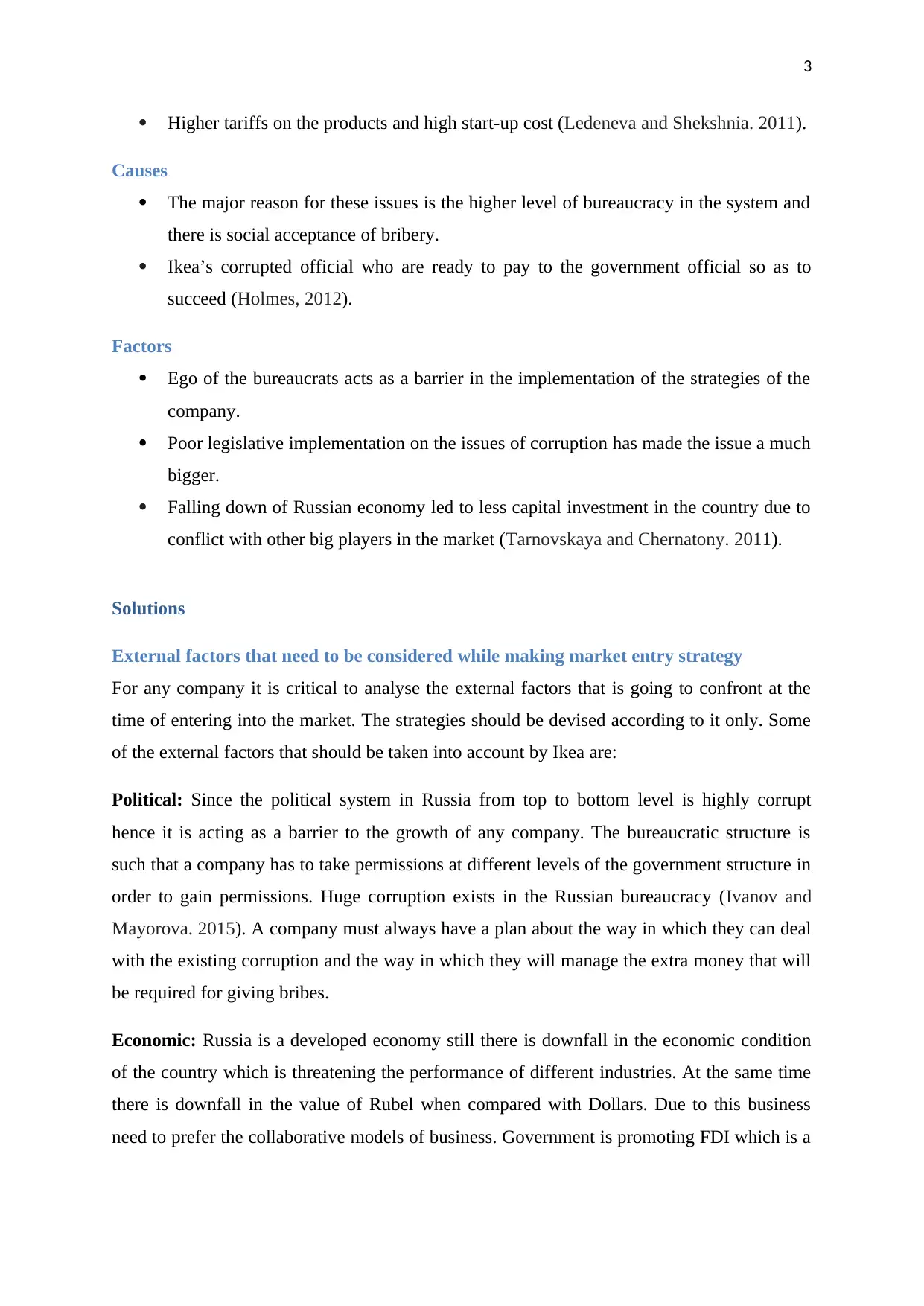
3
Higher tariffs on the products and high start-up cost (Ledeneva and Shekshnia. 2011).
Causes
The major reason for these issues is the higher level of bureaucracy in the system and
there is social acceptance of bribery.
Ikea’s corrupted official who are ready to pay to the government official so as to
succeed (Holmes, 2012).
Factors
Ego of the bureaucrats acts as a barrier in the implementation of the strategies of the
company.
Poor legislative implementation on the issues of corruption has made the issue a much
bigger.
Falling down of Russian economy led to less capital investment in the country due to
conflict with other big players in the market (Tarnovskaya and Chernatony. 2011).
Solutions
External factors that need to be considered while making market entry strategy
For any company it is critical to analyse the external factors that is going to confront at the
time of entering into the market. The strategies should be devised according to it only. Some
of the external factors that should be taken into account by Ikea are:
Political: Since the political system in Russia from top to bottom level is highly corrupt
hence it is acting as a barrier to the growth of any company. The bureaucratic structure is
such that a company has to take permissions at different levels of the government structure in
order to gain permissions. Huge corruption exists in the Russian bureaucracy (Ivanov and
Mayorova. 2015). A company must always have a plan about the way in which they can deal
with the existing corruption and the way in which they will manage the extra money that will
be required for giving bribes.
Economic: Russia is a developed economy still there is downfall in the economic condition
of the country which is threatening the performance of different industries. At the same time
there is downfall in the value of Rubel when compared with Dollars. Due to this business
need to prefer the collaborative models of business. Government is promoting FDI which is a
Higher tariffs on the products and high start-up cost (Ledeneva and Shekshnia. 2011).
Causes
The major reason for these issues is the higher level of bureaucracy in the system and
there is social acceptance of bribery.
Ikea’s corrupted official who are ready to pay to the government official so as to
succeed (Holmes, 2012).
Factors
Ego of the bureaucrats acts as a barrier in the implementation of the strategies of the
company.
Poor legislative implementation on the issues of corruption has made the issue a much
bigger.
Falling down of Russian economy led to less capital investment in the country due to
conflict with other big players in the market (Tarnovskaya and Chernatony. 2011).
Solutions
External factors that need to be considered while making market entry strategy
For any company it is critical to analyse the external factors that is going to confront at the
time of entering into the market. The strategies should be devised according to it only. Some
of the external factors that should be taken into account by Ikea are:
Political: Since the political system in Russia from top to bottom level is highly corrupt
hence it is acting as a barrier to the growth of any company. The bureaucratic structure is
such that a company has to take permissions at different levels of the government structure in
order to gain permissions. Huge corruption exists in the Russian bureaucracy (Ivanov and
Mayorova. 2015). A company must always have a plan about the way in which they can deal
with the existing corruption and the way in which they will manage the extra money that will
be required for giving bribes.
Economic: Russia is a developed economy still there is downfall in the economic condition
of the country which is threatening the performance of different industries. At the same time
there is downfall in the value of Rubel when compared with Dollars. Due to this business
need to prefer the collaborative models of business. Government is promoting FDI which is a
Paraphrase This Document
Need a fresh take? Get an instant paraphrase of this document with our AI Paraphraser
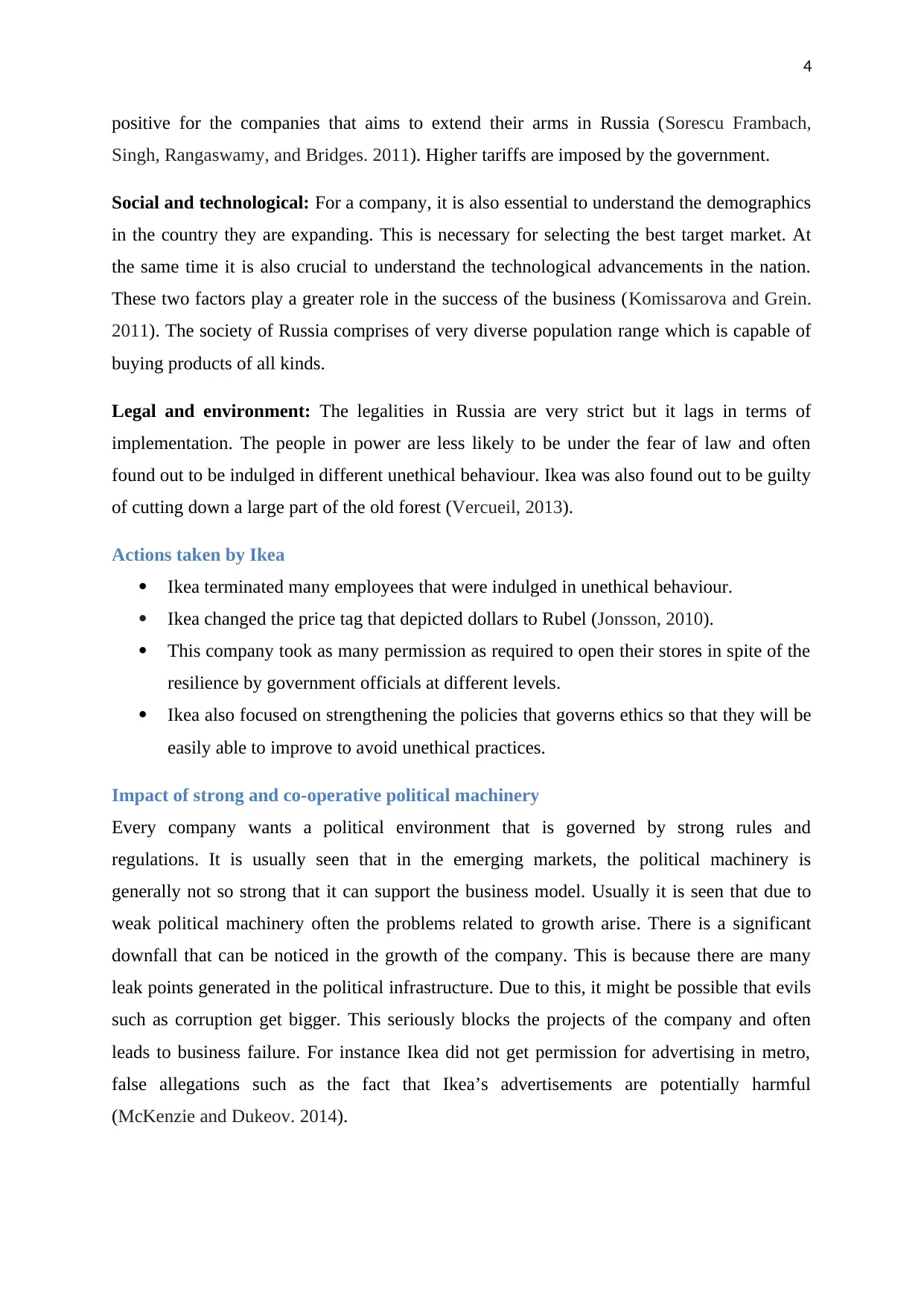
4
positive for the companies that aims to extend their arms in Russia (Sorescu Frambach,
Singh, Rangaswamy, and Bridges. 2011). Higher tariffs are imposed by the government.
Social and technological: For a company, it is also essential to understand the demographics
in the country they are expanding. This is necessary for selecting the best target market. At
the same time it is also crucial to understand the technological advancements in the nation.
These two factors play a greater role in the success of the business (Komissarova and Grein.
2011). The society of Russia comprises of very diverse population range which is capable of
buying products of all kinds.
Legal and environment: The legalities in Russia are very strict but it lags in terms of
implementation. The people in power are less likely to be under the fear of law and often
found out to be indulged in different unethical behaviour. Ikea was also found out to be guilty
of cutting down a large part of the old forest (Vercueil, 2013).
Actions taken by Ikea
Ikea terminated many employees that were indulged in unethical behaviour.
Ikea changed the price tag that depicted dollars to Rubel (Jonsson, 2010).
This company took as many permission as required to open their stores in spite of the
resilience by government officials at different levels.
Ikea also focused on strengthening the policies that governs ethics so that they will be
easily able to improve to avoid unethical practices.
Impact of strong and co-operative political machinery
Every company wants a political environment that is governed by strong rules and
regulations. It is usually seen that in the emerging markets, the political machinery is
generally not so strong that it can support the business model. Usually it is seen that due to
weak political machinery often the problems related to growth arise. There is a significant
downfall that can be noticed in the growth of the company. This is because there are many
leak points generated in the political infrastructure. Due to this, it might be possible that evils
such as corruption get bigger. This seriously blocks the projects of the company and often
leads to business failure. For instance Ikea did not get permission for advertising in metro,
false allegations such as the fact that Ikea’s advertisements are potentially harmful
(McKenzie and Dukeov. 2014).
positive for the companies that aims to extend their arms in Russia (Sorescu Frambach,
Singh, Rangaswamy, and Bridges. 2011). Higher tariffs are imposed by the government.
Social and technological: For a company, it is also essential to understand the demographics
in the country they are expanding. This is necessary for selecting the best target market. At
the same time it is also crucial to understand the technological advancements in the nation.
These two factors play a greater role in the success of the business (Komissarova and Grein.
2011). The society of Russia comprises of very diverse population range which is capable of
buying products of all kinds.
Legal and environment: The legalities in Russia are very strict but it lags in terms of
implementation. The people in power are less likely to be under the fear of law and often
found out to be indulged in different unethical behaviour. Ikea was also found out to be guilty
of cutting down a large part of the old forest (Vercueil, 2013).
Actions taken by Ikea
Ikea terminated many employees that were indulged in unethical behaviour.
Ikea changed the price tag that depicted dollars to Rubel (Jonsson, 2010).
This company took as many permission as required to open their stores in spite of the
resilience by government officials at different levels.
Ikea also focused on strengthening the policies that governs ethics so that they will be
easily able to improve to avoid unethical practices.
Impact of strong and co-operative political machinery
Every company wants a political environment that is governed by strong rules and
regulations. It is usually seen that in the emerging markets, the political machinery is
generally not so strong that it can support the business model. Usually it is seen that due to
weak political machinery often the problems related to growth arise. There is a significant
downfall that can be noticed in the growth of the company. This is because there are many
leak points generated in the political infrastructure. Due to this, it might be possible that evils
such as corruption get bigger. This seriously blocks the projects of the company and often
leads to business failure. For instance Ikea did not get permission for advertising in metro,
false allegations such as the fact that Ikea’s advertisements are potentially harmful
(McKenzie and Dukeov. 2014).
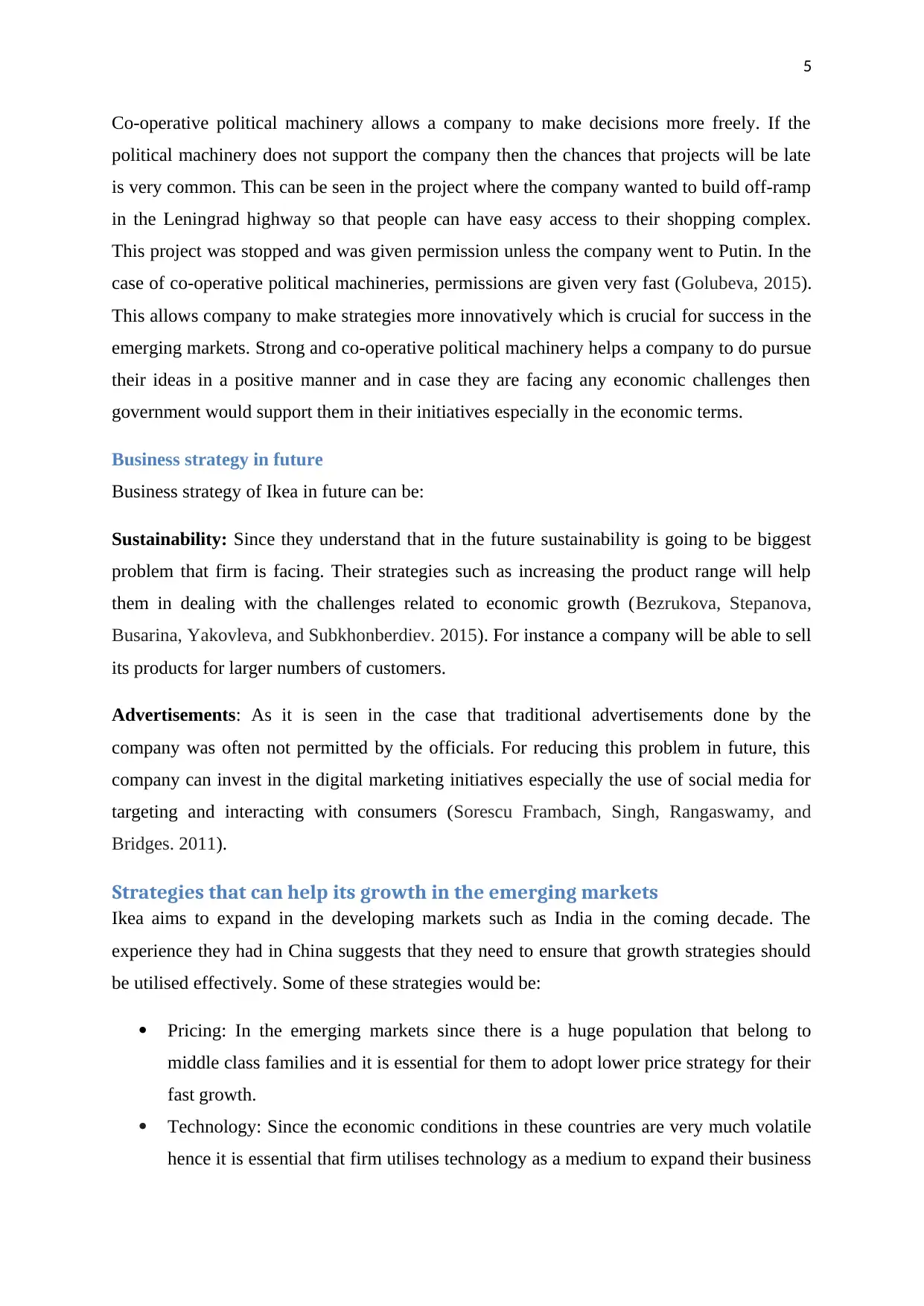
5
Co-operative political machinery allows a company to make decisions more freely. If the
political machinery does not support the company then the chances that projects will be late
is very common. This can be seen in the project where the company wanted to build off-ramp
in the Leningrad highway so that people can have easy access to their shopping complex.
This project was stopped and was given permission unless the company went to Putin. In the
case of co-operative political machineries, permissions are given very fast (Golubeva, 2015).
This allows company to make strategies more innovatively which is crucial for success in the
emerging markets. Strong and co-operative political machinery helps a company to do pursue
their ideas in a positive manner and in case they are facing any economic challenges then
government would support them in their initiatives especially in the economic terms.
Business strategy in future
Business strategy of Ikea in future can be:
Sustainability: Since they understand that in the future sustainability is going to be biggest
problem that firm is facing. Their strategies such as increasing the product range will help
them in dealing with the challenges related to economic growth (Bezrukova, Stepanova,
Busarina, Yakovleva, and Subkhonberdiev. 2015). For instance a company will be able to sell
its products for larger numbers of customers.
Advertisements: As it is seen in the case that traditional advertisements done by the
company was often not permitted by the officials. For reducing this problem in future, this
company can invest in the digital marketing initiatives especially the use of social media for
targeting and interacting with consumers (Sorescu Frambach, Singh, Rangaswamy, and
Bridges. 2011).
Strategies that can help its growth in the emerging markets
Ikea aims to expand in the developing markets such as India in the coming decade. The
experience they had in China suggests that they need to ensure that growth strategies should
be utilised effectively. Some of these strategies would be:
Pricing: In the emerging markets since there is a huge population that belong to
middle class families and it is essential for them to adopt lower price strategy for their
fast growth.
Technology: Since the economic conditions in these countries are very much volatile
hence it is essential that firm utilises technology as a medium to expand their business
Co-operative political machinery allows a company to make decisions more freely. If the
political machinery does not support the company then the chances that projects will be late
is very common. This can be seen in the project where the company wanted to build off-ramp
in the Leningrad highway so that people can have easy access to their shopping complex.
This project was stopped and was given permission unless the company went to Putin. In the
case of co-operative political machineries, permissions are given very fast (Golubeva, 2015).
This allows company to make strategies more innovatively which is crucial for success in the
emerging markets. Strong and co-operative political machinery helps a company to do pursue
their ideas in a positive manner and in case they are facing any economic challenges then
government would support them in their initiatives especially in the economic terms.
Business strategy in future
Business strategy of Ikea in future can be:
Sustainability: Since they understand that in the future sustainability is going to be biggest
problem that firm is facing. Their strategies such as increasing the product range will help
them in dealing with the challenges related to economic growth (Bezrukova, Stepanova,
Busarina, Yakovleva, and Subkhonberdiev. 2015). For instance a company will be able to sell
its products for larger numbers of customers.
Advertisements: As it is seen in the case that traditional advertisements done by the
company was often not permitted by the officials. For reducing this problem in future, this
company can invest in the digital marketing initiatives especially the use of social media for
targeting and interacting with consumers (Sorescu Frambach, Singh, Rangaswamy, and
Bridges. 2011).
Strategies that can help its growth in the emerging markets
Ikea aims to expand in the developing markets such as India in the coming decade. The
experience they had in China suggests that they need to ensure that growth strategies should
be utilised effectively. Some of these strategies would be:
Pricing: In the emerging markets since there is a huge population that belong to
middle class families and it is essential for them to adopt lower price strategy for their
fast growth.
Technology: Since the economic conditions in these countries are very much volatile
hence it is essential that firm utilises technology as a medium to expand their business
⊘ This is a preview!⊘
Do you want full access?
Subscribe today to unlock all pages.

Trusted by 1+ million students worldwide
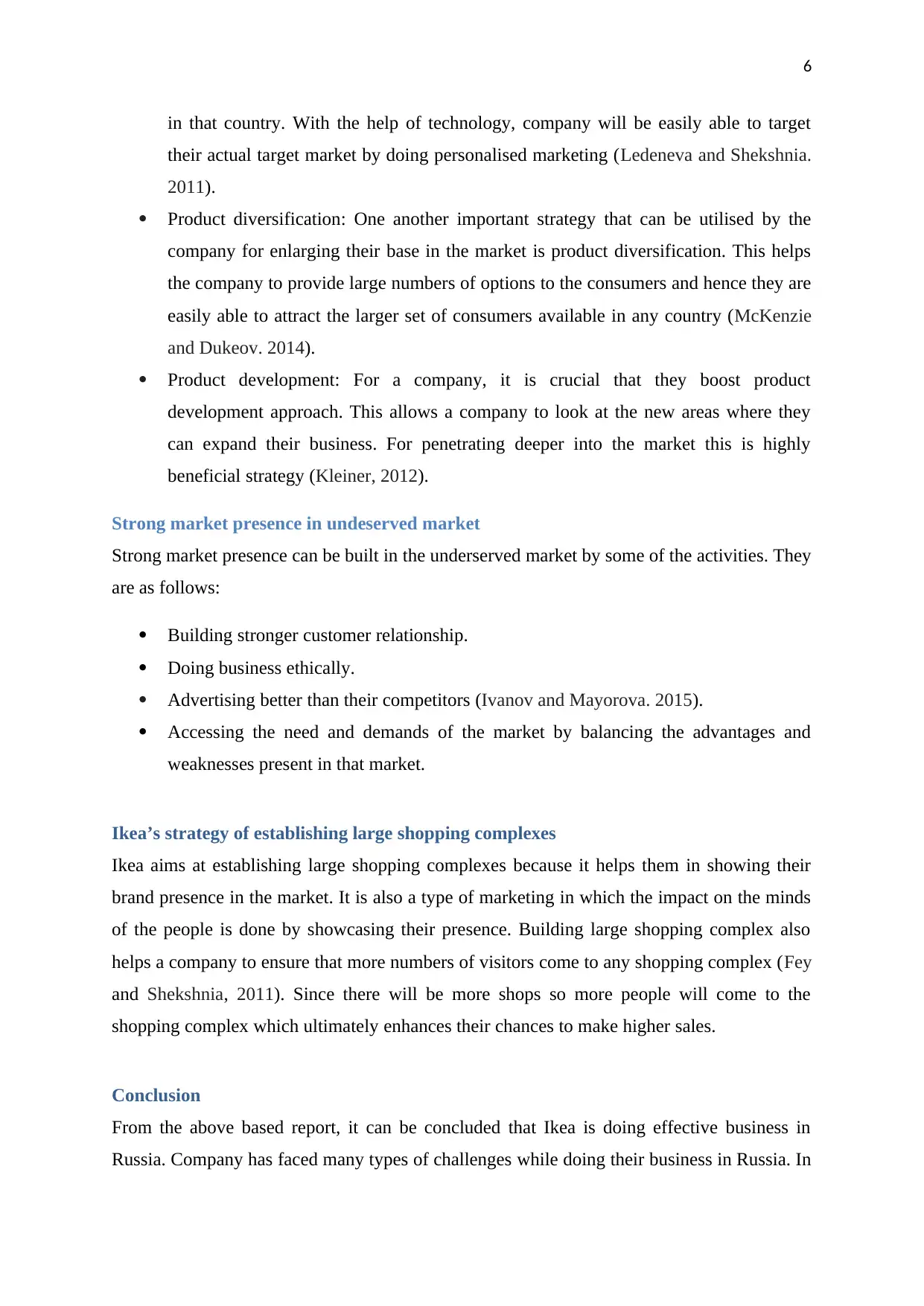
6
in that country. With the help of technology, company will be easily able to target
their actual target market by doing personalised marketing (Ledeneva and Shekshnia.
2011).
Product diversification: One another important strategy that can be utilised by the
company for enlarging their base in the market is product diversification. This helps
the company to provide large numbers of options to the consumers and hence they are
easily able to attract the larger set of consumers available in any country (McKenzie
and Dukeov. 2014).
Product development: For a company, it is crucial that they boost product
development approach. This allows a company to look at the new areas where they
can expand their business. For penetrating deeper into the market this is highly
beneficial strategy (Kleiner, 2012).
Strong market presence in undeserved market
Strong market presence can be built in the underserved market by some of the activities. They
are as follows:
Building stronger customer relationship.
Doing business ethically.
Advertising better than their competitors (Ivanov and Mayorova. 2015).
Accessing the need and demands of the market by balancing the advantages and
weaknesses present in that market.
Ikea’s strategy of establishing large shopping complexes
Ikea aims at establishing large shopping complexes because it helps them in showing their
brand presence in the market. It is also a type of marketing in which the impact on the minds
of the people is done by showcasing their presence. Building large shopping complex also
helps a company to ensure that more numbers of visitors come to any shopping complex (Fey
and Shekshnia, 2011). Since there will be more shops so more people will come to the
shopping complex which ultimately enhances their chances to make higher sales.
Conclusion
From the above based report, it can be concluded that Ikea is doing effective business in
Russia. Company has faced many types of challenges while doing their business in Russia. In
in that country. With the help of technology, company will be easily able to target
their actual target market by doing personalised marketing (Ledeneva and Shekshnia.
2011).
Product diversification: One another important strategy that can be utilised by the
company for enlarging their base in the market is product diversification. This helps
the company to provide large numbers of options to the consumers and hence they are
easily able to attract the larger set of consumers available in any country (McKenzie
and Dukeov. 2014).
Product development: For a company, it is crucial that they boost product
development approach. This allows a company to look at the new areas where they
can expand their business. For penetrating deeper into the market this is highly
beneficial strategy (Kleiner, 2012).
Strong market presence in undeserved market
Strong market presence can be built in the underserved market by some of the activities. They
are as follows:
Building stronger customer relationship.
Doing business ethically.
Advertising better than their competitors (Ivanov and Mayorova. 2015).
Accessing the need and demands of the market by balancing the advantages and
weaknesses present in that market.
Ikea’s strategy of establishing large shopping complexes
Ikea aims at establishing large shopping complexes because it helps them in showing their
brand presence in the market. It is also a type of marketing in which the impact on the minds
of the people is done by showcasing their presence. Building large shopping complex also
helps a company to ensure that more numbers of visitors come to any shopping complex (Fey
and Shekshnia, 2011). Since there will be more shops so more people will come to the
shopping complex which ultimately enhances their chances to make higher sales.
Conclusion
From the above based report, it can be concluded that Ikea is doing effective business in
Russia. Company has faced many types of challenges while doing their business in Russia. In
Paraphrase This Document
Need a fresh take? Get an instant paraphrase of this document with our AI Paraphraser
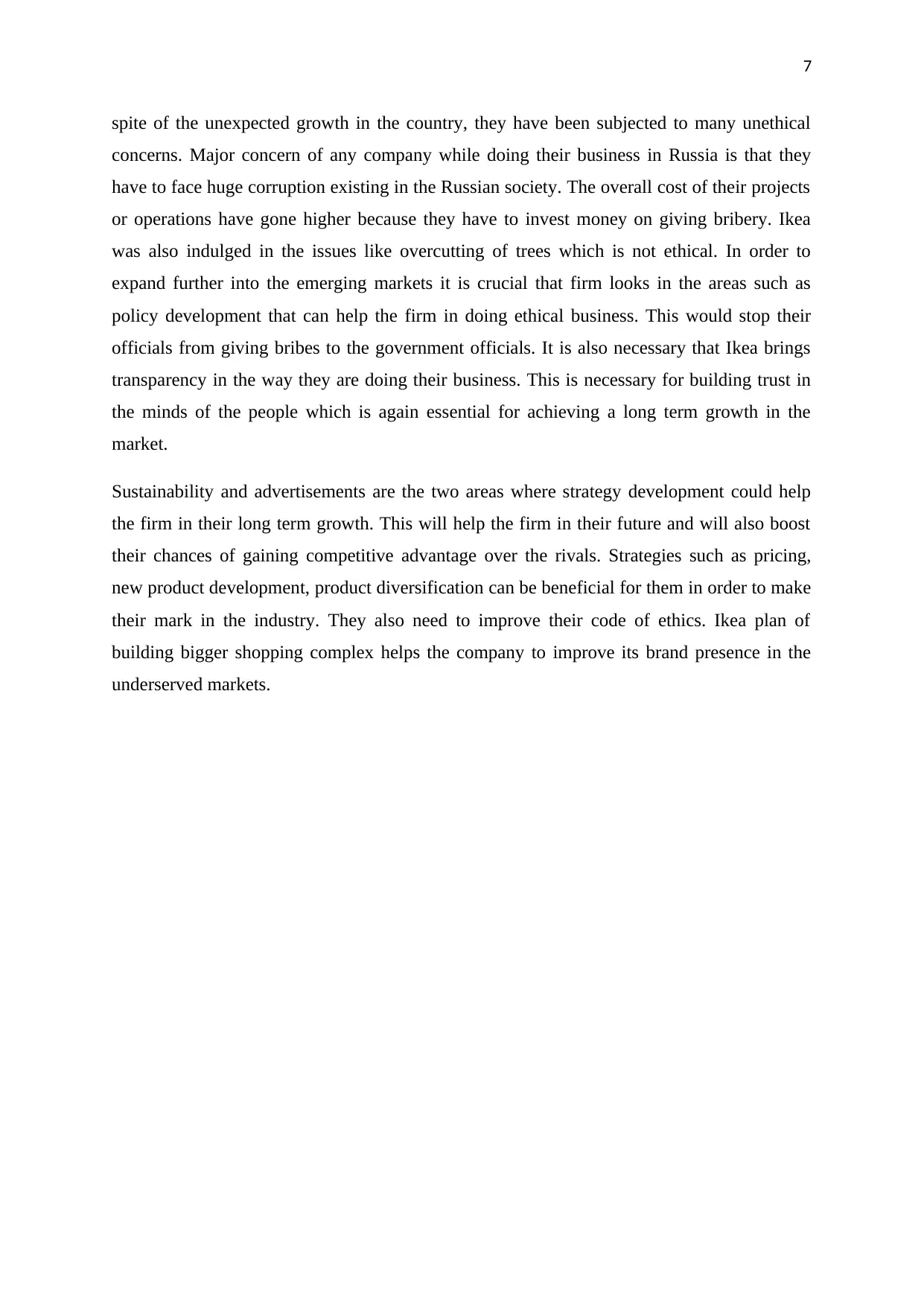
7
spite of the unexpected growth in the country, they have been subjected to many unethical
concerns. Major concern of any company while doing their business in Russia is that they
have to face huge corruption existing in the Russian society. The overall cost of their projects
or operations have gone higher because they have to invest money on giving bribery. Ikea
was also indulged in the issues like overcutting of trees which is not ethical. In order to
expand further into the emerging markets it is crucial that firm looks in the areas such as
policy development that can help the firm in doing ethical business. This would stop their
officials from giving bribes to the government officials. It is also necessary that Ikea brings
transparency in the way they are doing their business. This is necessary for building trust in
the minds of the people which is again essential for achieving a long term growth in the
market.
Sustainability and advertisements are the two areas where strategy development could help
the firm in their long term growth. This will help the firm in their future and will also boost
their chances of gaining competitive advantage over the rivals. Strategies such as pricing,
new product development, product diversification can be beneficial for them in order to make
their mark in the industry. They also need to improve their code of ethics. Ikea plan of
building bigger shopping complex helps the company to improve its brand presence in the
underserved markets.
spite of the unexpected growth in the country, they have been subjected to many unethical
concerns. Major concern of any company while doing their business in Russia is that they
have to face huge corruption existing in the Russian society. The overall cost of their projects
or operations have gone higher because they have to invest money on giving bribery. Ikea
was also indulged in the issues like overcutting of trees which is not ethical. In order to
expand further into the emerging markets it is crucial that firm looks in the areas such as
policy development that can help the firm in doing ethical business. This would stop their
officials from giving bribes to the government officials. It is also necessary that Ikea brings
transparency in the way they are doing their business. This is necessary for building trust in
the minds of the people which is again essential for achieving a long term growth in the
market.
Sustainability and advertisements are the two areas where strategy development could help
the firm in their long term growth. This will help the firm in their future and will also boost
their chances of gaining competitive advantage over the rivals. Strategies such as pricing,
new product development, product diversification can be beneficial for them in order to make
their mark in the industry. They also need to improve their code of ethics. Ikea plan of
building bigger shopping complex helps the company to improve its brand presence in the
underserved markets.
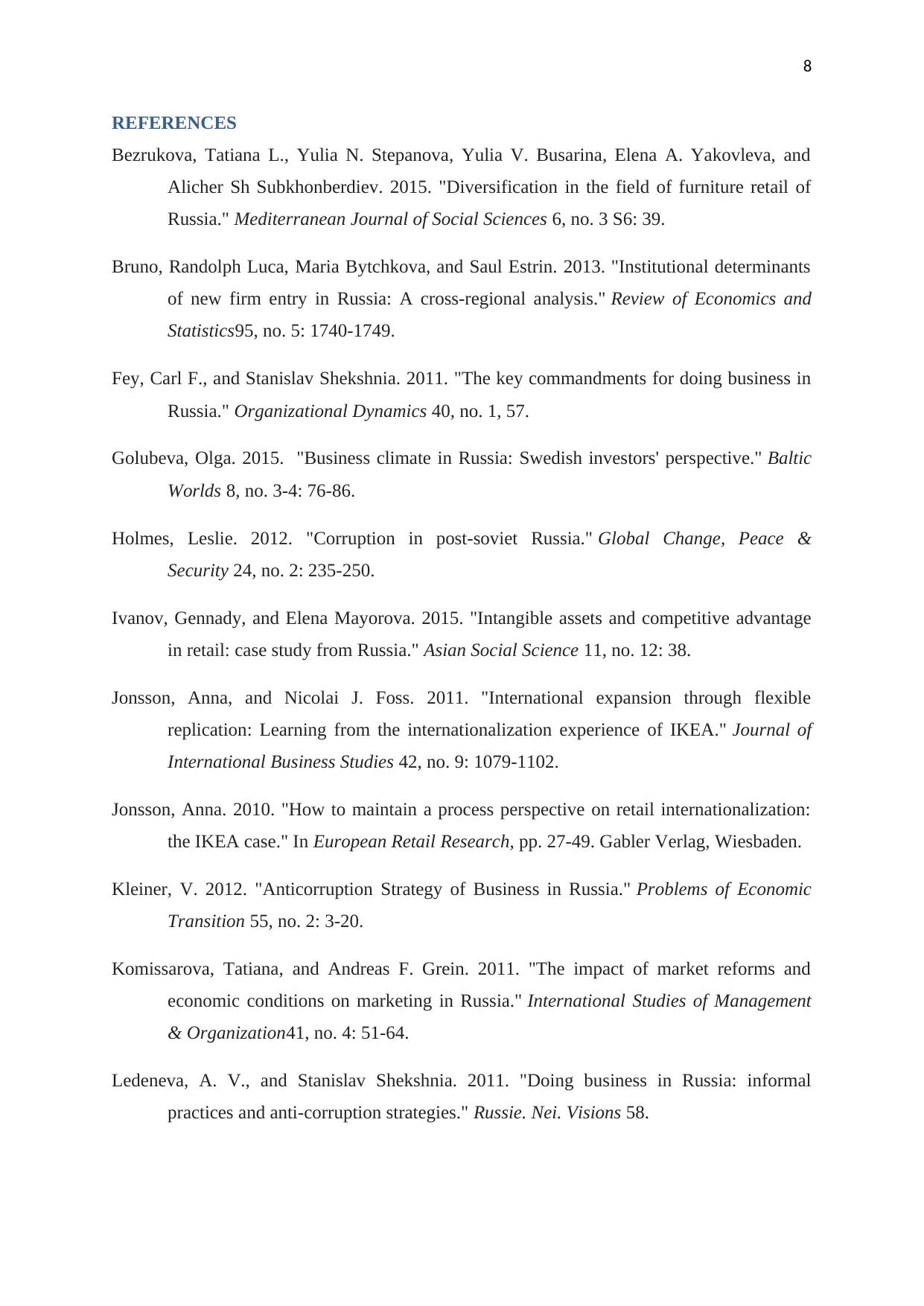
8
REFERENCES
Bezrukova, Tatiana L., Yulia N. Stepanova, Yulia V. Busarina, Elena A. Yakovleva, and
Alicher Sh Subkhonberdiev. 2015. "Diversification in the field of furniture retail of
Russia." Mediterranean Journal of Social Sciences 6, no. 3 S6: 39.
Bruno, Randolph Luca, Maria Bytchkova, and Saul Estrin. 2013. "Institutional determinants
of new firm entry in Russia: A cross-regional analysis." Review of Economics and
Statistics95, no. 5: 1740-1749.
Fey, Carl F., and Stanislav Shekshnia. 2011. "The key commandments for doing business in
Russia." Organizational Dynamics 40, no. 1, 57.
Golubeva, Olga. 2015. "Business climate in Russia: Swedish investors' perspective." Baltic
Worlds 8, no. 3-4: 76-86.
Holmes, Leslie. 2012. "Corruption in post-soviet Russia." Global Change, Peace &
Security 24, no. 2: 235-250.
Ivanov, Gennady, and Elena Mayorova. 2015. "Intangible assets and competitive advantage
in retail: case study from Russia." Asian Social Science 11, no. 12: 38.
Jonsson, Anna, and Nicolai J. Foss. 2011. "International expansion through flexible
replication: Learning from the internationalization experience of IKEA." Journal of
International Business Studies 42, no. 9: 1079-1102.
Jonsson, Anna. 2010. "How to maintain a process perspective on retail internationalization:
the IKEA case." In European Retail Research, pp. 27-49. Gabler Verlag, Wiesbaden.
Kleiner, V. 2012. "Anticorruption Strategy of Business in Russia." Problems of Economic
Transition 55, no. 2: 3-20.
Komissarova, Tatiana, and Andreas F. Grein. 2011. "The impact of market reforms and
economic conditions on marketing in Russia." International Studies of Management
& Organization41, no. 4: 51-64.
Ledeneva, A. V., and Stanislav Shekshnia. 2011. "Doing business in Russia: informal
practices and anti-corruption strategies." Russie. Nei. Visions 58.
REFERENCES
Bezrukova, Tatiana L., Yulia N. Stepanova, Yulia V. Busarina, Elena A. Yakovleva, and
Alicher Sh Subkhonberdiev. 2015. "Diversification in the field of furniture retail of
Russia." Mediterranean Journal of Social Sciences 6, no. 3 S6: 39.
Bruno, Randolph Luca, Maria Bytchkova, and Saul Estrin. 2013. "Institutional determinants
of new firm entry in Russia: A cross-regional analysis." Review of Economics and
Statistics95, no. 5: 1740-1749.
Fey, Carl F., and Stanislav Shekshnia. 2011. "The key commandments for doing business in
Russia." Organizational Dynamics 40, no. 1, 57.
Golubeva, Olga. 2015. "Business climate in Russia: Swedish investors' perspective." Baltic
Worlds 8, no. 3-4: 76-86.
Holmes, Leslie. 2012. "Corruption in post-soviet Russia." Global Change, Peace &
Security 24, no. 2: 235-250.
Ivanov, Gennady, and Elena Mayorova. 2015. "Intangible assets and competitive advantage
in retail: case study from Russia." Asian Social Science 11, no. 12: 38.
Jonsson, Anna, and Nicolai J. Foss. 2011. "International expansion through flexible
replication: Learning from the internationalization experience of IKEA." Journal of
International Business Studies 42, no. 9: 1079-1102.
Jonsson, Anna. 2010. "How to maintain a process perspective on retail internationalization:
the IKEA case." In European Retail Research, pp. 27-49. Gabler Verlag, Wiesbaden.
Kleiner, V. 2012. "Anticorruption Strategy of Business in Russia." Problems of Economic
Transition 55, no. 2: 3-20.
Komissarova, Tatiana, and Andreas F. Grein. 2011. "The impact of market reforms and
economic conditions on marketing in Russia." International Studies of Management
& Organization41, no. 4: 51-64.
Ledeneva, A. V., and Stanislav Shekshnia. 2011. "Doing business in Russia: informal
practices and anti-corruption strategies." Russie. Nei. Visions 58.
⊘ This is a preview!⊘
Do you want full access?
Subscribe today to unlock all pages.

Trusted by 1+ million students worldwide
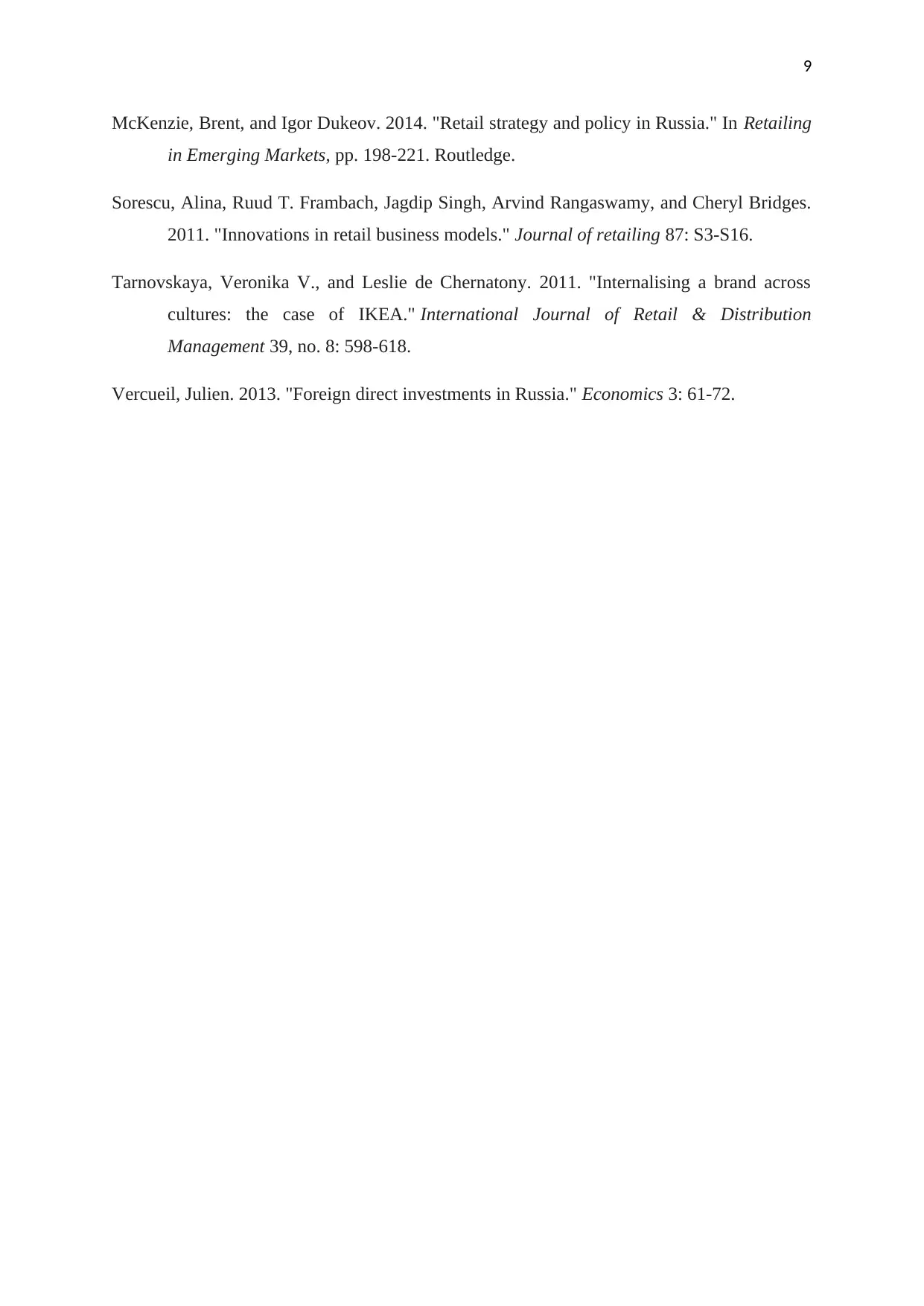
9
McKenzie, Brent, and Igor Dukeov. 2014. "Retail strategy and policy in Russia." In Retailing
in Emerging Markets, pp. 198-221. Routledge.
Sorescu, Alina, Ruud T. Frambach, Jagdip Singh, Arvind Rangaswamy, and Cheryl Bridges.
2011. "Innovations in retail business models." Journal of retailing 87: S3-S16.
Tarnovskaya, Veronika V., and Leslie de Chernatony. 2011. "Internalising a brand across
cultures: the case of IKEA." International Journal of Retail & Distribution
Management 39, no. 8: 598-618.
Vercueil, Julien. 2013. "Foreign direct investments in Russia." Economics 3: 61-72.
McKenzie, Brent, and Igor Dukeov. 2014. "Retail strategy and policy in Russia." In Retailing
in Emerging Markets, pp. 198-221. Routledge.
Sorescu, Alina, Ruud T. Frambach, Jagdip Singh, Arvind Rangaswamy, and Cheryl Bridges.
2011. "Innovations in retail business models." Journal of retailing 87: S3-S16.
Tarnovskaya, Veronika V., and Leslie de Chernatony. 2011. "Internalising a brand across
cultures: the case of IKEA." International Journal of Retail & Distribution
Management 39, no. 8: 598-618.
Vercueil, Julien. 2013. "Foreign direct investments in Russia." Economics 3: 61-72.
1 out of 10
Related Documents
Your All-in-One AI-Powered Toolkit for Academic Success.
+13062052269
info@desklib.com
Available 24*7 on WhatsApp / Email
![[object Object]](/_next/static/media/star-bottom.7253800d.svg)
Unlock your academic potential
Copyright © 2020–2026 A2Z Services. All Rights Reserved. Developed and managed by ZUCOL.





